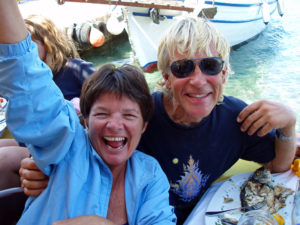A little more than two years ago Bob Riggle and Phyllis Macay were killed by pirates aboard a yacht they were helping sail across the Indian Ocean. Jean and Scott Adam, owners of the boat, were also killed during the standoff with the U.S. Navy. I knew Bob, and learned a lot about the vibrant Phyllis. They were good people. The Navy shipped home the pirates that survived the raid, and most of them have pleaded guilty . Three others are now standing trial and Attorney General Eric Holder is going for the death penalty. Here’s the original piece from The Seattle Times. –KH
Murder trial for Somalis in piracy case to begin
Associated Press
Trial begins Tuesday in Virginia for three Somali men charged with piracy and the 2011 murders of four Americans aboard a yacht off the coast of Africa.
The yacht’s owners, Jean and Scott Adam of Marina del Rey, Calif., and their friends, Bob Riggle and Phyllis Macay of Seattle, were shot to death in February 2011 after they were taken hostage at sea several hundred miles south of Oman. Eleven other men in the case have already pleaded guilty to piracy and been sentenced to life in prison, although prosecutors don’t believe any of them fired the fatal shots.
The Adamses had been sailing full-time on their 58-foot yacht after retiring several years earlier. Their boat was boarded by 19 men who sought to kidnap and ransom the Americans for millions of dollars. The pirates’ plan fell through when a U.S. Navy warship began shadowing the yacht as it made its way toward Somalia.
The Navy had told the pirates that they could keep the yacht in exchange for the hostages, but they refused to take the deal because they didn’t believe they would get enough money for the sailboat, according to court records. The pirates said the only person authorized to negotiate the Americans’ release was also based in Somalia.
The destroyer USS Sterett was maneuvering between the Quest and the Somali coast when a rocket-propelled grenade was fired at it. Soon after, shots rang out aboard the yacht Quest.
Court documents say the Americans were being held in the yacht’s steering wheel house by seven men when the Americans were fired upon. Other pirates have said they tried to stop the shooting once it started, but by the time Navy SEALs scrambled aboard the yacht, each of the Americans had already been shot.
Four of the hijackers died on board – including two who have also been identified in court records as those who shot at the Americans. One person was released by authorities because he is a juvenile.
Ahmed Muse Salad, Abukar Osman Beyle and Shani Nurani Shiekh Abrar each face multiple charges that could bring them the death penalty, including hostage-taking resulting in death, violence against maritime navigation resulting in death and kidnapping resulting in death. In all, 22 of the 26 counts with which the defendants are charged are death-eligible offenses.
Executions under federal law are extremely rare. Only three out of more than 1,300 executions in the U.S. since 1976 have been carried out by the federal government, according to the Death Penalty Information Center, which tracks death penalty statistics and is opposed to the death penalty
U.S. Attorney General Eric Holder made the decision to seek the death penalty. Ultimately, the U.S. is trying to send a message to would-be pirates: Stay away from U.S.-flagged vessels.
Defense attorneys have objected to the possibility of the death penalty for Salad because they claim he is mentally handicapped. A ruling on that issue isn’t expected until the trial is completed in four to six weeks. Prosecutors have previously said Salad has demonstrated a lack of remorse in the Americans’ deaths and made boastful statements about them.
Jury selection in the case begins Tuesday, and defense attorneys have submitted a lengthy list of questions they want to ask potential jurors. Among other things, the questionnaires focus on jurors’ views on the death penalty, the extensive media coverage of piracy and their relationships to the military. Defense attorneys unsuccessfully argued for the trial to be moved out of Norfolk because the region is home to a large military presence that includes the world’s largest naval base and serves as the home of East Coast-based Navy SEALs.
Some of the personnel and ships that responded to the hijacking are also based in the area, and the attorneys had feared their clients couldn’t get a fair trial as a result of the large military presence.
“Simply put, the community in Norfolk has a very personal stake in piracy issues that prejudices the defendants. These prejudices will become that much more exaggerated in the event that defense counsel contends that the deaths occurred in this case partly because the Navy failed to follow proper protocol,” their court filing asserted.
The pirates who pleaded guilty in the case are expected to testify against the three charged with murder. They agreed to testify in exchange for the possibility of reduced sentences and eventual deportation to Somalia.
Many of them have also expressed remorse for the Americans’ deaths. Defense attorneys are seeking to prohibit those statements from being admitted into evidence during the murder trial.



